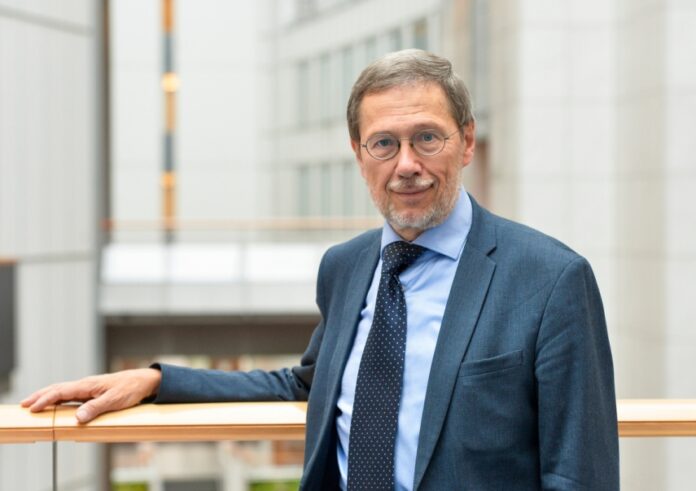
After making history in Lithuania by finding the long-sought 1918 Lithuanian Independence Act, Liudas Mažylis, a chemistry doctor by first profession, who became a professor of political science and an avid history enthusiast, is a member of the European Parliament’s group of the European People’s Party. When asked about the parallels between World War I and the Russian war against Ukraine, he responded: “Paradoxically, certain parallels can be drawn. The technologies of war ammunition have advanced, but the inner logics [sic] and mechanisms are similar,” Mažylis told The Baltic Times Magazine. The politician also added that the Act declaring the Independence of Lithuania was adopted in a remarkably similar and difficult period: World War I was still going on, and the Spanish Flu pandemic was raging (now we have COVID-19). Now, after Lithuania’s long journey to freedom, Mažylis, who represents Lithuania in one of the most important EU institutions, notes that historical memory helps, but the future of Europe is our responsibility.
Speaking about the development of wars, especially that of WWI, he said he was encouraged to delve very deeply into the archival documents of the era while searching for the Lithuanian Independence Act. He remarked that “at the beginning of the war, the warring countries were rejoicing, as the behaviour of some of the countries was just unbearable to the others. Notably, all of them thought that the war would last one month or so and, just as significantly, all of them thought they would win it.”
Russia’s war against independent Ukraine has been going on since 2014. The aggressor started the total invasion on February 24, 2022. And the future of the war in Ukraine is hard to predict. “And once it is over, once Ukraine wins it, I predict that we will find ourselves in quite a different geopolitical world.”
There is no doubt about the solidarity of European states and their leaders for Ukraine, but it is no secret that there are individuals, certain interest groups and political movements in Europe who are trying to manipulate the discourse of the war in Ukraine, specifically, to raise doubts about the crimes of the Kremlin and the perpetrators of the war, he continued.
According to recently released US intelligence data, since 2014 alone Russia has spent more than 300 million dollars on the financing of political movements abroad. Such shocking financial indicators are accompanied by arguments that some of the extreme left and right political parties were dominant in receiving dirty Russian money.
“The European Commission’s Vice President Margaritis Schinas has recently said that the Commission will definitely determine which European political parties and politicians have received secret Russian funding. I hope he will follow up on his promise.”
The number of former EU politicians in Russian energy companies before the start of the war in Ukraine indicated that the Kremlin was increasing its influence in the European political elite. “I would call it not only political corruption, but also a betrayal of Europe and its values”, said Mažylis.
He explained that propaganda can be countered by telling the truth, because it is impossible to deny a lie with another lie. Secondly, counter-propaganda statements must be accurate and easy to understand. Thirdly, it must be operative, fast. Obviously, it is not easy to achieve this. After all, the Kremlin spends a long time preparing its elaborate lies, carefully and without sparing resources. Therefore, perhaps the most important thing is to increase the understanding and ability of each citizen to independently decide what is true and what is false. This is what Europe must strive for not only through legislation, but also through public education and raising its awareness.
Mažylis is a member of the European Parliament’s Committee on Environment, Public Health and Food Safety (ENVI). He noted that if anyone thought that Russia’s aggression in Ukraine would diminish the importance of the EU’s Green Deal (the EU’s main green policy objective being to be climate-neutral by 2050 and have an economy with net-zero greenhouse gas emissions), the opposite has happened. The need for Europe to become less dependent on Russian fossil fuels makes the Green Deal even more relevant.
In a recent sitting of the Committee, Ukraine’s Minister of Environmental Protection and Natural Resources, Ruslan Strilets, said that the damage to the environment is horrendous and almost immeasurable. It is estimated that the cost of damage inflicted on Ukraine’s environment had reached 36 billion euros by October 2022. The country is suffering from high air and soil pollution, as well as excessive CO2 emissions. That is the direct damage, and the indirect damage can be just as high. However, both the European Union and Ukraine, which was recently granted EU candidate status, are well aware of that, so, once the war is over, the country will have to commit to the EU’s green course – with the European Union’s assistance along the way.
The energy situation we are in (the rise of natural gas prices, the primary result of the energy market shake-ups prior to the war) has pushed some EU member states, like Germany for example, to go back to fossil fuels in their power generation. Meanwhile, Poland has been perhaps the most notorious polluter due to its extensive use of coal, which is abundant in the country.
In short, the war has prevented the EU green course from being implemented on time. However, no one intends to stop its implementation altogether.





























